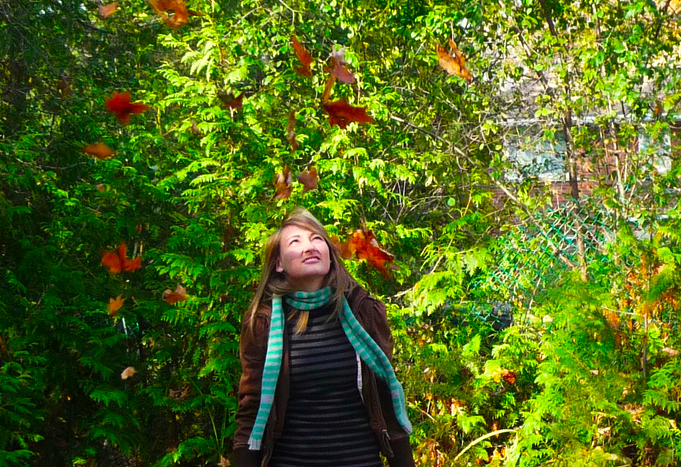
“You must welcome change as the rule but not your ruler” ~Denis Waitley
My name is Hannah, and I find it hard to deal with change.
As much as I used to want to think of myself as flexible and easy-going, I struggle to live up to these ideals. I like to know where I am, what I’m doing, where I’m going, and to have my near future mapped out in lists, to-dos, and ideas. In short, I do whatever I can to minimize the level of uncertainty in my life.
My discomfort around uncertainty means I am usually very decisive. In some ways this has been beneficial; for example, it’s allowed me to make hard decisions that I might have otherwise been tempted to avoid or delay.
In other ways, it’s been a disadvantage, especially when I’ve prioritized removing my discomfort above anything else, and made decisions without having all the information I really needed first.
Historically, when life’s ups and downs have left me feeling uncertain, I’ve done whatever I need to do to regain my sense of control. Keeping my options open or “going with the flow” provokes feelings of restlessness, impatience, and eventually frustration; after all, why leave things up to chance when you could have a plan?
My relationship with change, well, changed at the end of last year, when my partner and I embarked on a seven-month trip around South America and Mexico. Over the past few months, I have experienced different cultures, climates, environments, people, food, languages, and many more changes than I could have imagined.
During the first couple of months, I discovered a lot about my need for control, and how it affects my day-to-day experience. Working through this, I’ve learned to find a balance between meeting that need, and flowing with the many changes that come from moving between different places, countries, and cultures.
Here are five elements that have been invaluable in this process of adapting to change:
1. Learn to differentiate between what you can and can’t control.
One of the most important lessons I learned early on in my travels was the difference between factors I could control and factors I couldn’t control. For example, I could control whether I left enough time to get to an airport or a bus station to catch my next connection to a different city or country; however, I couldn’t control whether that plane or bus actually left on time.
As well as learning to place events in their rightful control-related categories, I learned to appreciate the importance of acceptance, and the emotional freedom this provides. Once I accepted that I couldn’t control some changes, I felt less anxious about them.
2. Keep a journal.
Keeping a diary or journal has been one of the most helpful activities for processing the changes I’ve experienced.
During my trip, I’ve embraced my morning pages routine (writing 3 A4 pages, or approximately 750 words stream-of-consciousness, as described by Julia Cameron in The Artist’s Way). This has helped me keep a record of the many things I’ve seen and experienced, and has also helped me recognize a strong limiting belief.
Through keeping a journal, I’ve realized that my aversion to change was based on a fear that I wouldn’t be able to cope with it. Reflecting on some of the experiences I’ve had and the way I’ve processed them, however, I recognized that I actually have far more internal strength than I previously gave myself credit for.
3. Develop routines, even small ones.
Developing small routines and habits has helped me stay grounded and connected to myself. In turn, this has enabled me to feel more accepting of other changes happening around me.
As well as morning pages, I have developed other routines (such as having the same breakfast most days and dedicating Saturday mornings to learning Spanish), that have helped meet my need for consistency and stability.
When it feels like everything else around us is in flux, finding small comforts to hold on to can make all the difference in how we process and deal with other changes in our lives.
4. Connect with others who are sharing a similar experience.
Talking to other travelers and hearing about their experience of long-term travel has helped me realize that I’m not alone in how I feel. Change is hard, even if you’ve volunteered for it. As one friend said to me a few days ago: “Just because you’ve chosen to do this doesn’t mean it has to be perfect.”
Talking to people back home about the struggles I’ve encountered has felt hard. Part of me feels guilty complaining about enormous bugs and travel sickness when people back home are enduring a freakishly cold winter and still doing the 9 to 5. But fellow travelers understand, and knowing that I’m not alone has helped me accept some of the more negative aspects of the changes I’ve experienced.
5. Take care of your basic needs.
Taking care of your basic needs is absolutely crucial if you are in a period of change. These needs are like the foundations of our physical and mental health; without them, we’re unlikely to be able to process additional challenges in a healthy way.
My non-negotiables are sleep, hygiene, exercise, and healthy food. When I have these things, I am a happy camper and can deal with external changes far more easily. When I don’t have them, my tolerance levels drop, I feel stressed and I find it hard to flow with other changes that are happening around me.
Your basic needs might be similar to mine, or they might be different. When you’re able to identify and prioritize them, however, you give yourself a much better chance of encountering change with minimal stress and anxiety.
What are your tips for dealing with change? Leave a comment and let us know.
About Hannah Braime
Hannah Braime is a coach and writer who believes the world is a richer place when we have the courage to be fully self-expressed. She shares practical psychology-based articles, tools and resources on living a full and meaningful life over at Becoming Who You Are. Get free access to workbooks, audios and much more when you join the community.












 Though I run this site, it is not mine. It's ours. It's not about me. It's about us. Your stories and your wisdom are just as meaningful as mine.
Though I run this site, it is not mine. It's ours. It's not about me. It's about us. Your stories and your wisdom are just as meaningful as mine.
This article reminds me of the saying “Man plans and God laughs” and I think this is a big one. Instead of getting surprised every time our planning gets messed up we should welcome it as expected. Don’t fall into the trap of always thinking next week will have fewer unexpected interruptions. It won’t. Practically this means leaving a lot of free time in our planning whenever possible to deal with the unexpected stuff that will inevitably show up. Thanks for sharing, Hannah!
Thanks Patrik! I agree with your perspective: if something messes up our plans, we can either fix it and get back on course, or go with the flow. If we can’t fix it that’s OK – we might as well enjoy the unexpected new direction 🙂 I like your practical tip too, thanks for sharing!
You know, my main project is focused on supporting widows – it is people who have to embrace the last change they wanted in their life and most probably one of the biggest and most difficult ever. Because of the emotional charge, especially in the beginning there are only few ways around it, and one of them is to move through change by making tiny, tiny steps. Your 5 suggestions, even if they have emerged from a totally different experience are simply perfect for a widow learning to cope with change.
Which proves beyond doubt that you’re really offering something universal here!
And, I just love your opening paragraphs. Admitting that change is
challenging (especially when you appear and perhaps are expected to be
flexible) is powerful, and brave!
Thank you!
Thanks Halina, I appreciate your feedback and I’m glad to hear that the suggestions are applicable to different contexts. I hope they’re useful to you and the people who are involved in your project.
It sounds like you’re doing incredibly valuable and much-needed work.
I am so tired of reading posts about super privileged people who take years off to travel or meditate or recover. I’d love to see some stories that apply to the rest of us. I realize the trip was not the point of this post, and that I probably sound bitter, but it’s so hard to take advice when you don’t and can’t relate to life circumstance.
You do sound bitter:) I can relate b/c I too have a day job, but I wanted to point out that being able to travel and living a super privileged life are not synonymous. I used to travel and ramble around in Europe, back when I was flat broke. I believe you are limiting yourself with your belief!
Hi guest,
I understand that it’s tiring to read about people going off and traveling, etc. when it feels like you can’t do that. I’d like to clarify that I’ve been working this entire trip, so it hasn’t been ‘time off’ per se, and I wouldn’t have been able to do it if I hadn’t been working (I’m very grateful for the internet!)
It can be hard to hear this, but going traveling isn’t just the domain of the super-privileged, it’s a choice. If you want it to happen, you can make it happen. It takes time and a shedload of planning but it’s totally possible – if you let yourself view it as a possibility.
Thank you for graciously pointing out that travel, just like most things is life, is a choice.
My tips for dealing with change are: 1. It’s inevitable, 2. Uncertainty is certain, and 3. A flexible mind and an open heart will solve most problems.
Wonderful post, Hannah–thank you!
Like you Hannah, I also worked my way through one of my 3 month trips, I got up every day at 5am and worked to fit other time zones, and had the time of my life doing it. But it took a heck of a lot of planning to make it happen. Where there is a will, there is a way. 🙂
I’d agree with this…. travelling is open to all, it really is….. :)))) We can’t all go 5 star but if we are willing to put up with discomfort, than the world is yours… :)))))
To the guest above, I am another of those “super privileged people who take years off to travel or meditate or recover” – I also took six months off last year to explore a different side of life. The thing was, I’m not super-privileged – I was at the time working two jobs, including early-morning shift work, to cover the bills, I gave up my house, pretty much all of the money I was holding as a deposit to buy somewhere, and even sold most of my possessions to help pay the travel costs. Whilst we were away we lived within a very basic budget and adjusted our transportation and food accordingly.
It probably cost about the same as staying stuck in London, griping about my day-to-day existence, and it taught me some invaluable lessons. One of which is, as mentioned in the article, not to live in fear of change or risk, but to pick the outcome you want and pool all of your resources into achieving it.
I wasted the first 39 years of my life clinging onto things for fear of losing them, and failing to start things in case they weren’t controllable or perfect. Learning to just enjoy living (and even make mistakes along the way) was in my mind the best decision I ever made.
Lisa
http://www.theworstpossibledecision.blogspot.com
Hooray Lisa! That’s awesome to hear, and I love what you said about making mistakes.
The cost issue is really interesting as it seems to be a huge (and understandable) barrier to entry when it comes to long-term travel, but it’s possible to go away and spend less than you usually do if you pay attention to what you’re buying and where from. Our month-to-month COL here has been up to 40% lower than in the UK and we’ve had a great (even slightly better?) quality of life too.
Congrats on making the decision that was right for you, I hope you had an amazing trip 🙂
Love your post Hannah!! I’m an RCF (recovering control freak!) and totally relate to your words. It wasn’t until I realised how much I used to attempt to control everything, that I finally realised how exhausting it had been. I thought my highly organised, assertive self was my ‘strong suit’, and it was, it had led to success in many areas of my life. But, it was also my weakness. Highly organised and assertive was my cover up (unbeknownst to me for many years!) for a fear of things going wrong, fear of being out of control, fear of life happening to me instead of me happening to life. Well, it’s been a tough road to recovery! I went a little bit radical with it and, of my own choosing, tipped my life upside down (where I lived, who I spent time with, my career, who I was, what I did) and for the last 3 years, change has been a constant. In fact, it’s been the only constant. Nothing like plenty of practise for kicking that control freak habit in the butt. My favourite tip from your post is #5. It’s all too easy to let ourselves get completely out of balance physically, mentally and emotionally when we’re in an experience of change and feeling like we’re losing our grip/ability to maintain control. One too many times I let myself get out of balance and stressed out along the path in my journey. Now, I’ve learnt meditation every day is essential if I’m to retain my sanity on this roller coaster ride I’ve chosen to take to create my new life. And, lots of fresh air, nutritious food and plenty of sleep. Look forward to reading more of your posts. Bernadette x
Thanks so much Bernadette! I can really relate to what you said about your ‘strong suit’ also being a bit of an achilles heel and a mask for not wanting to live with uncertainty – I’ve definitely been there big time! I like how you’ve found meditation as a way of grounding yourself, it’s so effective for taking time out when things are getting crazy (and when they’re not) and reminding ourselves that we’re still here, and we’re doing fine 🙂
Perfectly said, meditation is a still time that reminds me that “I’m doing fine” – restorative is the word that pops to mind. Neat to be in touch Hannah, and I’ve visited your site so look forward to staying connected on social media etc Bernadette 🙂
Great advice! I love the recommendations…I am a bit the opposite in that I actively seek change and delay making decisions because I have a fear of commitment and “knowing” what is next. I love spontaneity so much, but have failed to live spontaneously lately b/c of my day job! Anyhow…I plan to start journaling routinely in hopes that inner truths and my life’s purpose continues to unfold and that I can live more authentically.
That’s great to hear Hilary! I’ve found journaling so helpful just for exploring options, possibilities and desires. The more we give ourselves space to explore without pressure to act, the more the truths come forward 🙂 I hope you can regain some of your spontaneity and meet that need again soon.
A sense of humor helps immensely.
Some great points there Hannah. I particularly like and relate to the morning pages technique, something I do whenever I can, traveling or not.
Traveling is also a great technique for looking at yourself as it exposes things that you may not have noticed before. I recall living overseas and realizing that things that I blamed on my environment were really just things within me. That didn’t make them any easier to look at, but they were a good reality check. Even 100 years ago, we wouldn’t be able to zip around the world and experience new cultures, peoples and other sides of ourselves.
I’ve just come across this article while feeling quite low and worried about a change ahead – not a big one, but one that I’m concerned about my ability to handle. Thank you for sharing what helps you. It’s helped me to think through my worry a bit and to both plan a bit but also to feel more open to the opportunities that this change might also bring. I’ve bookmarked this to come back to! Thanks so much
My recommendation is to anticipate the changes each new turn in the road presents so they do not come as surprises.
Ryokan